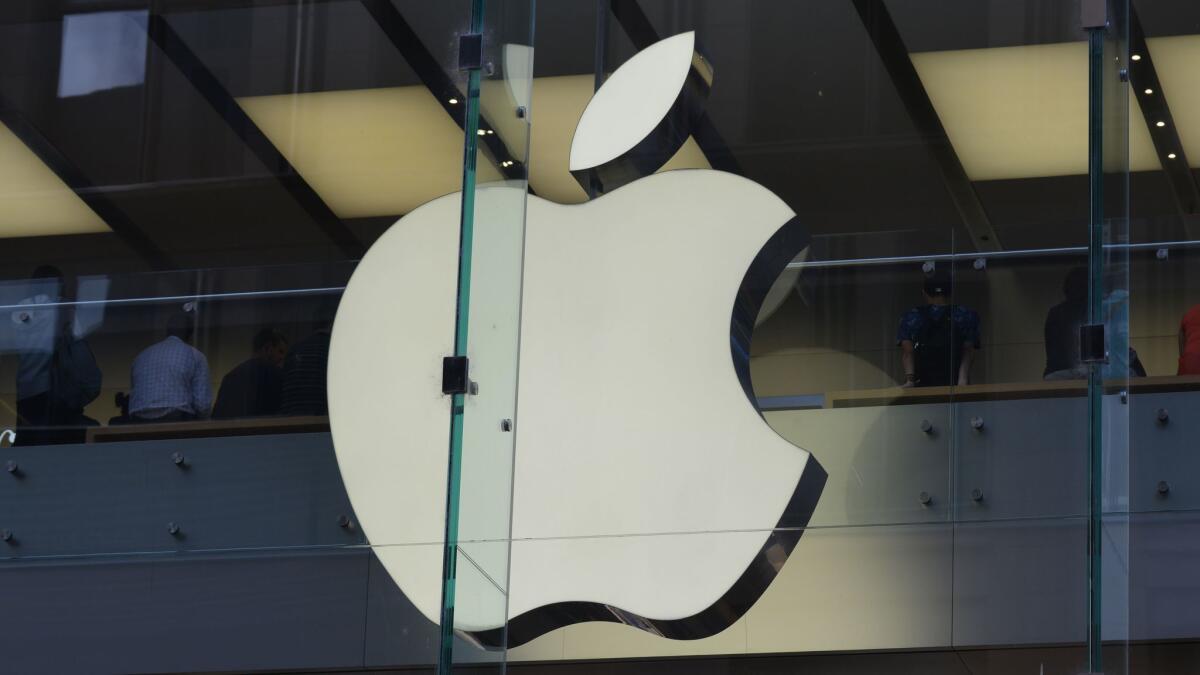Apple receives permit to test self-driving cars in California

- Share via
Apple became the world’s most valuable tech company by changing the way we communicate. Now it’s looking at changing the way we get around.
The Cupertino firm received a permit on Friday from the state Department of Motor Vehicles to test self-driving vehicles on public streets in California.
For the record:
12:40 a.m. Jan. 24, 2025An earlier version of this article incorrectly reported the model of the test vehicles that Apple’s permit covers, based on information from the DMV. The permit covers Lexus RX450h vehicles from the 2015 model year.
Though the permit covers only three vehicles, it’s the biggest concrete evidence that the company sees itself as a player in the race to bring self-driving cars to the road.
As Detroit automakers rush to staff research facilities in Silicon Valley — General Motors pledged Thursday to hire more than 1,100 California employees — tech firms don’t want to lose the chance to develop the software or hardware that powers self-driving cars.
The DMV said the company’s permit covers three Lexus RX450h vehicles from model year 2015, as well as six human drivers who will oversee the tests.
When asked to comment on the permit, Apple referred to a statement issued in December after the company submitted feedback to the National Highway Traffic Safety Administration on the agency’s guidelines for self-driving vehicle development.
At the time, Apple said it was “investing heavily in machine learning and autonomous systems,” and that there are “many potential applications for these technologies, including the future of transportation.”
The filing is a rare look into Apple’s largely secretive automotive work.
Several months ago, reports suggested Apple was abandoning rumored plans for a car manufacturing business, as hundreds of members of the company’s car team were let go, reassigned or left the project.
Bloomberg reported in October that Apple was shifting its focus to developing an autonomous driving system, giving the company more flexibility either to work with other automakers or eventually return to building an actual vehicle.
Analysts agreed Friday that the permit indicates Apple is still working on software at least.
“It doesn’t necessarily mean they’re going to manufacture a vehicle, but it certainly means they’re continuing to work in the autonomous vehicle space,” said Rebecca Lindland, executive analyst at Kelley Blue Book.
Such a move could help bolster Apple’s offerings as it faces decreasing interest in its core products, such as the iPhone, iPad and Mac. The company’s 2016 net sales declined 8%, or $18.1 billion, largely because of a year-over-year drop in iPhone sales.
In contrast, the company saw an increase in net sales for its services category, driven by growth in its App Store, licensing and AppleCare sales. Analysts speculate that Apple car software — essentially a dashboard iOS — could one day be sold as a service.
“The analysts and investor community are always looking for what is the next growth driver for Apple,” said Grayson Brulte, co-founder and president of Brulte & Co., an innovation advisory and consulting firm. “And I believe it’s services.”
Apple could eventually create an ecosystem in which consumers hail a self-driving vehicle powered by Apple software by tapping their iPhone, then listen to Apple Music during the ride, Brulte said.
Huge questions remain about self-driving vehicles, who will want them and who will make them.
Apple faces an increasingly crowded field of competitors. In California alone, 29 other automakers, autonomous technology companies and other firms have received test permits from the DMV. Google, for instance, has been testing on public roads for several years and racked up 2 million miles of driving since 2009.
Though seemingly late to the game and small in scale, analysts said Apple’s public entrance into the field should not be taken lightly.
“It’s a shot across the bow in a very, very big way,” Brulte said.
Gambling on self-driving vehicles representing the future of their businesses, automakers have staffed up in California, where engineering talent has more experience in software design than car design.
The latest is GM, which on Thursday received an $8-million tax credit from a California economic development board for promising to hire more than 1,100 workers in the state. The hires will bolster GM’s autonomous vehicle division in the Bay Area.
Development of autonomous vehicles is “much more technology-dependent,” and requires network and data transmission knowledge, said Dan Edmunds, director of vehicle testing at Edmunds.com.
That’s a big change for the Detroit automakers that gave the Motor City its name.
“With the power of Silicon Valley playing a key role in the development of autonomous vehicles, it only makes sense to go where the talent is,” said Lindland of Kelley Blue Book.
The Associated Press contributed to this report.
Twitter: @smasunaga
UPDATES:
3:55 p.m.: This article was updated with comment from analysts.
12:15 p.m.: This article was updated with comment from an analyst and news of hires for GM’s autonomous vehicle division.
This article was originally published at 10:55 a.m.
More to Read
Inside the business of entertainment
The Wide Shot brings you news, analysis and insights on everything from streaming wars to production — and what it all means for the future.
You may occasionally receive promotional content from the Los Angeles Times.











